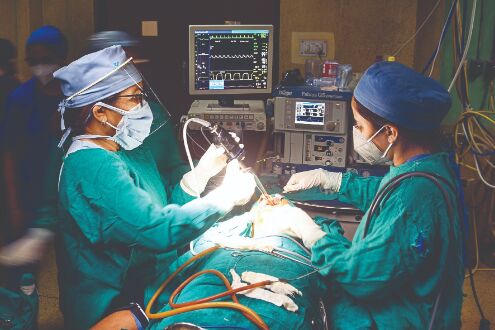Excessive steroids, unhealthy lifestyle, diabetes help disease to spread in COVID-19 patients

New Delhi: As India is still struggling with the second wave of COVID-19, the spurt in a rare fungal infection called mucormycosis or black fungus has started emerging another major challenge for the governments at the Centre and states. Even though mucormycosis is a rare fungal disease that affects 1 in 10,00,000 people, its overall mortality rate is much higher at about 50 per cent.
The black fungus, which had been an issue among those with diabetes before the outbreak of the pandemic, is spreading among those infected with or recovered from COVID-19 in hospitals across the country. The rare disease has added to the woes of the medical community and 'overburdened' the healthcare system of the country.
The major causes of fungal infection are uncontrolled diabetes, immunosuppression as excessive use of steroids reduces immunity. Diabetes patients are at high risk of getting infected with black fungus due to high sugar level. Patients who have cancer and who had gone through organ transplants are also at high risk as chemotherapy decreases immunity. In some cases, prolonged ICU stay has also resulted in contracting black fungus infection.
The cases of mucormycosis have been reported from different parts of Maharashtra and Gujarat as both the states have registered a sudden spurt in black fungus cases. Maharashtra has reported about 2,000 and Gujarat recorded 1,163 such cases. Madhya Pradesh has reported 281 such cases and 27 deaths, followed by Uttar Pradesh (73 cases, 2 deaths) and Telangana (60 cases).
Similarly, cases of the disease have also been reported from Karnataka, Delhi, Rajasthan, Bihar, Telangana, Chhattisgarh, Odisha, Delhi, etc.
In Karnataka, which has reported about 180 cases of the rare disease among COVID-19 and post-COVID-19 patients, 54 patients have lost their vision and 14 have died.
Even though the cases of black fungus are on the rise in almost every state and it has not yet been declared an epidemic, the Rajasthan government led by Chief Minister Ashok Gehlot has declared black fungus disease an epidemic in the state.
Rajasthan, which reported around 100 black fungus patients, has prepared a separate ward at Sawai Man Singh (SMS) Hospital in Jaipur for treatment of patients suffering from black fungus disease.
Notably, while responding to a question on black fungus disease, Niti Aayog member (health) Dr VK Paul had on May 7 said, "The occurrence of mucormycosis is natural and the correlation between mucormycosis and COVID-19 is not exclusive. The people having high blood sugar level are more prone to the risk as the infection affects only those."
The major cause of concern regarding the treatment of the fungal infection is costly medicines. According to Dr Yudhyavir Singh, who is managing COVID ICU at AIIMS-Delhi, the drugs used in black fungus treatment are beyond the reach of common people as the medicines such as Amphotericin B, injection posconazole, syrup posoconazole used in treating black fungus cost around Rs 3,500 per vial, Rs 4,000-Rs 5,000/vial and Rs 1,600-Rs 2,000/bottle respectively.
Suggesting precautionary measures, the AIIMS doctor said, "The use of steroids must be supervised and there should be no self-medication of steroids. Blood sugar level must be in control and always use a mask to prevent from inhaling fungal spores. Also, cover the cut or abrasion area."
"Detection of black fungus is very difficult as tests are not done in small towns. Also, it is very difficult to treat the disease. Its treatment should be started soon after it is diagnosed as the complications and death rate are high. If not treated on time, the patients may face complete vision loss, and eyeballs have to be removed," Dr Singh said, adding that if it affects the brain, it can cause stroke resulting in paralysis and death.
As per the ICMR guidelines, the symptoms of the disease are pain and redness around eyes and/or nose, fever, headache, coughing, shortness of breath, bloody vomit, altered mental status, etc.
If patients notice sinusitis-nasal blockade or congestion, nasal discharge (blackish/bloody), local pain on the cheekbone and one-sided facial pain, numbness or swelling, toothache, blurred or double vision with pain, chest pain, worsening of respiratory symptoms, etc then it could be a suspect case of black fungus.
The ICMR has made it very clear that people should not miss warning signs and symptoms and not to consider all cases with blocked nose as black fungus suspects. The tests like KOH staining, microscopy, culture, MALDITOF can be done to detect fungal etiology and people should not lose crucial time by hesitating to initiate treatment.
The worrisome aspect of 'medical emergency' is the fight against the disease is getting tough due to the shortage of an antifungal drug —Amphotericin B. To deal with drug shortage, the governments of Delhi and Telangana have formed panels to monitor the availability as well as hoarding of Amphotericin B.



